A representative of one of the largest automakers in the world said there is still a concern for the supply chain for the minerals needed to support the automotive battery vehicle market.
Simon Thibault, EV critical minerals leader, global purchasing and supply chain director for General Motors, said the concern is that the supply chain must be secure, sustainable and competitive. He said Canada is one of the best mineral producing countries in the world, but large sums of government money will still be needed to keep the battery electric supply chain secure.
Thibault was one of the key speakers Thursday at Sudbury's BEV-In-Depth conference held at Cambrian College.
Thibault, who has a background that includes mining, works on GM's North American sourcing strategy for EV critical minerals.
He told the conference the battery electric vehicle industry needs more than raw materials such as nickel, copper, lithium and graphite. He said most of those minerals need some level of processing to convert them into cathode active materials (CAM) and anode active materials (AAM) that can be then used in the manufacture of automotive batteries.
The other big concern said Thibault is acquiring a sustainable source of raw materials. He said the announcement (November 2022) of Vale Canada Limited partnering with GM on a nickel sulphate supply deal was a good example.
That new plant is located in Bécancour, Que., and the details were revealed just last week.
"The project we have in Quebec actually is a very good example," said Thibault. "So we think the raw materials and actually the partnership with Vale, in my opinion, is a game changer. Because this will be the first time ever that a mineral extracted from the ground of Canada will actually be processed entirely in Canada, to produce cathode active materials and feed the facility that will be in the U.S. So it will be the first time ever right now in North America, and most likely also in the Western world."
What makes the project stand out for Thibault is that it meets GM’s requirements for raw materials that are secure, sustainable, scalable and cost competitive.
He said it is not like that in the rest of the world.
Thibault said all the major auto companies are scrambling to get partnerships to acquire critical minerals, but if they cannot get what they need in North America, they are likely to turn to Asia.
"And this is not secure. This is not sustainable. This is not scalable. And this is not cost competitive. This is the reason why at GM we've made investments and established strategic partnerships all along the supply chain."
Thibault said there is still a concern about acquiring enough raw materials in Canada.
"A problem we have right now, not just in Canada, is that about two-thirds of the resources that we have in battery materials are in the hands of junior mining companies. I mean I love junior mining companies. I spent 15 years of my career in junior mining companies. That's great. But the thing is that there's two things we miss; financial resources, human resources," said Thibault.
He added there is no way junior miners could meet the need in the next decade.
Thibault said more government support and funding is needed along with planning and policy changes to achieve more partnerships such as the Bécancour project.
He said GM invested more than $600 million in Bécancour but that never would have happened if the government of Quebec had not already invested $350 in industrial infrastructure to make the GM project shovel ready.
Len Gillis covers mining and health care for Sudbury.com.
